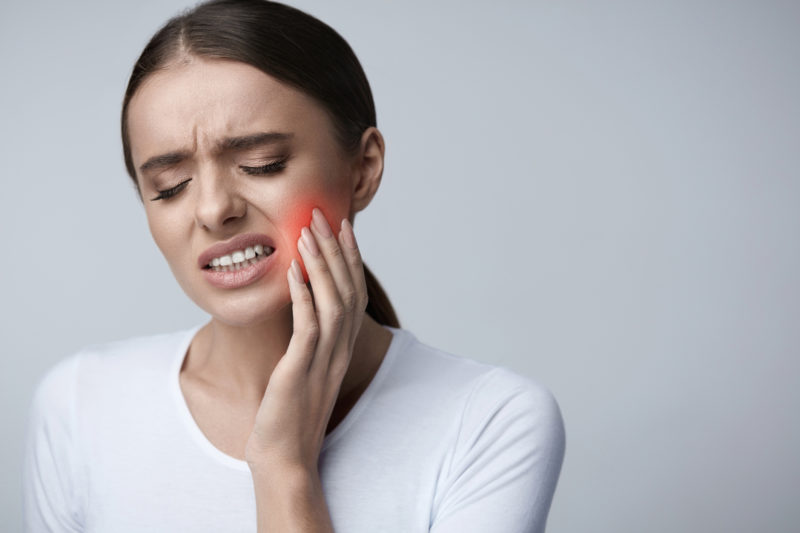Why is it that Wisdom Teeth can cause so much pain when they are coming through? And how can we relieve wisdom tooth pain until they are ready to be removed?
Wisdom Teeth are the last teeth to come through. There are usually 4 of them and are also known as the Third molars. They often erupt between the ages of 17-23 but can be outside of this age group. Around the age of 18, our bodies and jaws stop growing (vertically at least). This is the age when wisdom teeth are trying to come through. As a result, they often lack the space to develop fully and become ‘impacted’. They can sometimes come in at an angle or even sideways.
Impacted wisdom teeth can damage surrounding teeth and gums and can cause pain and infections and sometimes develop cysts. Not all impacted teeth are painful and not all wisdom teeth need to be removed so it is important to have your wisdom teeth checked at the dentist. In the early adulthood they need to be closely monitored even if they do not require removal. Your dentist will need to take a full mouth x-ray to check the positions and roots of these teeth.
Wisdom teeth pain can come at the worst of times, such as university or school Exams or even first dates! Anxiety and stress can often trigger the inflammatory mediators responsible for the pain!

Dentistry On Coolum’s 5 tips to relieve wisdom tooth pain till you can get to the dentist!
So, here are 5 simple tips to enjoy the foods you do, including CHOCOLATE, and ways to protect your teeth while you’re at it!
1. Numbing Gel
Numbing gels contain topical anesthetic that help numb the gums around the teeth causing pain. The active ingredient in these gels is Lignocaine. Some numbing gels such as the SM-33 Gel can be purchased at your local pharmacist. The gel only provides temporary relief and are not indicated for prolonged use. If symptoms persist, seek medical advice to rule out infection or impaction.
2. Paracetamol and Ibuprofen
While individually these are both effective, best results when taken together. Some brands have combined these 2 pain medications together such as MAXIGESIC and NUROMOL and can be purchased over the counter at your local pharmacy. Ibuprofen is a NSAID (Nonsteriodal anti-inflammatory drug) and helps reduce inflammation.
3. Chlorhexidine/Salt Water Rinses
Chlorhexidine mouthwashes such as Savacol are an antiseptic mouthwash that help reduce the bacterial count in the mouth. Warm salty water contains Sodium Chloride which contains natural disinfectant properties. The act of thorough mouth rinses helps wash away the bacteria and plaque causing pain and irritation. Most people don’t know but one of the ways to protect your teeth is to chew sugar-free gum. It promotes saliva production and removes food debris from the grooves of your teeth. Sugar-free gum can help freshen your breath until you get a chance to brush your teeth, for those that are always on the go! For ongoing relief, rinse the affected area every three hours using warm salt water.
4. Ice Packs
Ice packs or ice wrapped in a towel pressed against the painful area can also help reduce inflammation. The cold from the ice can also have a numbing effect on the painful gums.
5. Clove Oil
For centuries cloves have been used to relieve pain. They work by acting as a numbing agent when it gets in contact with the gums. Use a cotton bud or cotton ball, soak it in small drops of clove oil, then apply to the affected areas. If symptoms persist, seek medical advice as there may be a deeper underlying issue such as an abscess or severe impaction.
These remedies will help you relieve wisdom tooth pain until you can get into your dentist to have it treated properly. Pain from impacted wisdom teeth can often recur every few months. Even in the absence of symptoms, they can be a reservoir for bacteria and plaque and can affect the overall health of the mouth. Where infections are present, your dentist may need to prescribe a course of antibiotics.
The best time to have your impacted wisdom teeth removed is before the age of 25. This is because bone around the wisdom teeth are still ‘soft’ making it easier to remove. The appointment is quicker and patients are able to recover a lot faster. Depending on difficulty, most people only need ‘a long weekend’ to recover 😊

Author: Dr Mohil


